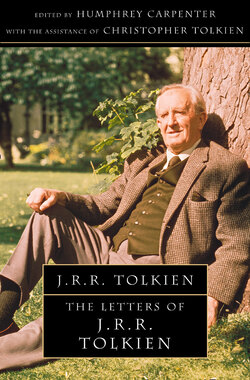Читать книгу The Letters of J. R. R. Tolkien - Christopher Tolkien - Страница 13
7 To the Electors of the Rawlinson and Bosworth Professorship of Anglo-Saxon, University of Oxford
Оглавление[In the summer of 1925 the Professorship of Anglo-Saxon at Oxford was advertised, following the resignation of W. A. Craigie. Tolkien decided to apply, though he was only thirty-three. This is his formal letter of application, dated 27 June 1925.]
Gentlemen,
I desire to offer myself as a candidate for the Rawlinson and Bosworth Professorship of Anglo-Saxon.
A Chair which affords such opportunity of expressing and communicating an instructed enthusiasm for Anglo-Saxon studies and for the study of the other Old Germanic languages is naturally attractive to me, nor could I desire anything better than to be reassociated in this way with the Oxford English School. I was a member of that School both as undergraduate and as tutor, and during my five years’ absence in Leeds am happy to have remained in touch with it, more especially, in the last two years, as an Examiner in the Final Schools.
I entered Exeter College as Stapledon Exhibitioner in 1911. After taking Classical Moderations in 1913 (in which I specialized in Greek philology), I graduated with first class honours in English in 1915, my special subject being Old Icelandic. Until the end of 1918 I held a commission in the Lancashire Fusiliers, and at that date entered the service of the Oxford English Dictionary. I was one of Dr. Bradley’s1 assistants until the spring of 1920, when my own work and the increasing labours of a tutor made it impossible to continue.
In October 1920 I went to Leeds as Reader in English Language, with a free commission to develop the linguistic side of a large and growing School of English Studies, in which no regular provision had as yet been made for the linguistic specialist. I began with five hesitant pioneers out of a School (exclusive of the first year) of about sixty members. The proportion to-day is 43 literary to 20 linguistic students. The linguists are in no way isolated or cut off from the general life and work of the department, and share in many of the literary courses and activities of the School; but since 1922 their purely linguistic work has been conducted in special classes, and examined in distinct papers of special standard and attitude. The instruction offered has been gradually extended, and now covers a large part of the field of English and Germanic philology. Courses are given on Old English heroic verse, the history of English*, various Old English and Middle English texts*, Old and Middle English philology*, introductory Germanic philology*, Gothic, Old Icelandic (a second-year* and third-year course), and Medieval Welsh*. All these courses I have from time to time given myself; those that I have given personally in the past year are marked*. During this last session a course of voluntary reading of texts not specially considered in the current syllabus has attracted more than fifteen students, not all of them from the linguistic side of the department.
Philology, indeed, appears to have lost for these students its connotations of terror if not of mystery. An active discussion-class has been conducted, on lines more familiar in schools of literature than of language, which has borne fruit in friendly rivalry and open debate with the corresponding literary assembly. A Viking Club has even been formed, by past and present students of Old Icelandic, which promises to carry on the same kind of activity independently of the staff. Old Icelandic has been a point of special development, and usually reaches a higher standard than the other special subjects, being studied for two years and in much the same detail as Anglo-Saxon. . . . .
The large amount of teaching and direction which my post has hitherto involved, supplemented by a share in the general administration of a growing department, and latterly by the duties of a member of Senate at a time of special difficulty in University policy, has seriously interfered with my projects for publishable work; but I append a note of what I have found time to do. If elected to the Rawlinson and Bosworth Chair I should endeavour to make productive use of the opportunities which it offers for research; to advance, to the best of my ability, the growing neighbourliness of linguistic and literary studies, which can never be enemies except by misunderstanding or without loss to both; and to continue in a wider and more fertile field the encouragement of philological enthusiasm among the young.
I remain,
Gentlemen,
Your obedient servant,
J. R. R. Tolkien.
